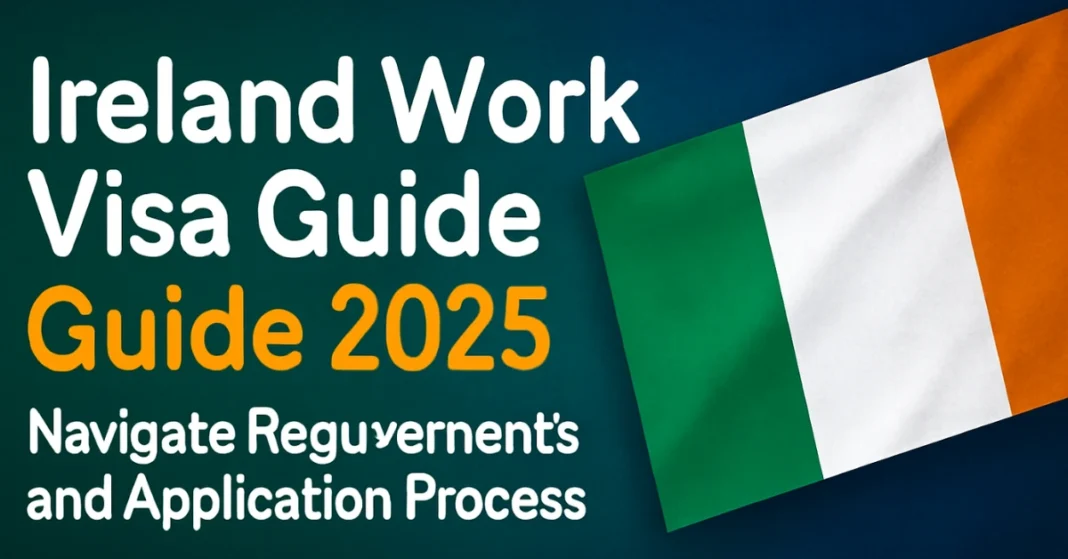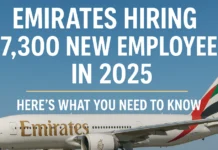Dreaming of Working in Ireland? Here’s How to Make It Happen
Imagine living in the heart of Europe, surrounded by beautiful landscapes, friendly people, and a growing job market. That’s Ireland—and in 2025, it’s more open than ever to skilled foreign workers.
If you’re wondering how to apply for an Ireland work visa, you’re in the right place. This simple guide walks you through the whole process—from requirements to application—so you can plan your move with confidence.
Real Example:
“I moved to Dublin in 2024 as a data analyst. The Critical Skills Employment Permit helped me get permanent residency in just 2 years!” – Asad, Pakistan
What Are the Main Types of Ireland Work Visas in 2025?
Ireland doesn’t offer a one-size-fits-all work visa. There are different options depending on your job, skills, and salary.
| Visa Type | Who It’s For | Minimum Salary |
|---|---|---|
| Critical Skills Employment Permit | Skilled professionals (e.g. IT, engineering, healthcare) | €38,000–€64,000 |
| General Employment Permit | Jobs not on the Critical Skills list | €30,000+ |
| Intra-Company Transfer Permit | Employees of multinational companies | Varies |
| Contract for Services Permit | Employees on specific short-term contracts | Varies |
Expert Tip:
If your job is on Ireland’s Critical Skills list, you can apply for PR (permanent residency) after just 2 years!
Who’s Eligible to Apply for an Irish Work Visa in 2025?
To qualify, you must:
-
Have a valid job offer from an Irish employer
-
Meet the minimum salary threshold
-
Have relevant skills or qualifications
-
Be a non-EU/EEA/Swiss national
-
Pass a basic health and character check
Pro Insight:
Jobs in IT, construction, healthcare, and finance are in high demand in 2025. That means faster visa processing for these fields!
How to Apply for an Ireland Work Visa in 2025 (Step-by-Step)
Step 1: Secure a Job Offer
You can’t apply without one. Browse job sites like IrishJobs.ie or check with global recruiters.
Step 2: Apply for an Employment Permit
Your employer or you must apply through the Department of Enterprise, Trade and Employment (DETE) at enterprise.gov.ie
Step 3: Pay the Visa Fee
Permit fees vary:
-
Critical Skills Permit: €1,000
-
General Employment Permit: €500–€1,000 depending on duration
Step 4: Submit Your Visa Application
Once your permit is approved, apply for a Long Stay ‘D’ Visa online at Irish Immigration Service.
Step 5: Prepare for Arrival
Upon landing in Ireland, register with your local Immigration Officer and get your Irish Residence Permit (IRP).
Also Read: Australia Skilled Worker Visa July 2025 Update: Step-by-Step Application Process
How Long Does It Take to Get a Work Visa for Ireland?
On average:
-
Employment permit: 6–8 weeks
-
Long-stay visa: 4–6 weeks
So overall, plan for about 2–3 months from job offer to landing.
Bolded Question: Can I Bring My Family to Ireland on a Work Visa?
Yes, you can! If you’re on a Critical Skills Permit, your spouse and kids can join you—and even apply for their own work permits.
People Also Ask
Is IELTS required for Ireland work visa?
No, Ireland doesn’t officially require IELTS. But your employer may ask for proof of English proficiency.
Can I apply for PR in Ireland after a work visa?
Yes. If you hold a Critical Skills Permit, you can apply for permanent residency after 2 years.
Is there an age limit for Ireland work visa?
No fixed limit, but most permits are offered to working-age professionals, usually between 21–55.
How much bank balance is needed for Ireland work visa?
You don’t need to show personal funds for employment permits. But having enough to cover initial living expenses is recommended.
What’s the minimum salary for Ireland work visa in 2025?
It depends on the permit type. €30,000+ for General Employment; €38,000–€64,000 for Critical Skills.
What’s New in Ireland Work Visa Rules for 2025?
In 2025, the Irish government added:
-
Faster processing for high-demand sectors
-
Expanded Critical Skills Occupation List
-
Easier family reunification policies
Personal Note:
“The visa rules in 2025 are friendlier than ever—especially for tech and healthcare workers. It’s a great time to apply.” – Ali, Migration Consultant
Conclusion:
If you’re looking for a job abroad, Ireland is one of the best countries to work and settle in. With its strong economy, skilled worker demand, and easy-to-navigate visa system, it’s a smart move for 2025.
Just make sure you meet the criteria, apply early, and follow each step closely. Good luck!
CTA:
Found this guide helpful? Share it with a friend or let us know in the comments if you’re planning your move to Ireland!
FAQs:
1. How can I get a work visa for Ireland from outside the EU?
Get a job offer first, apply for a work permit, then submit your visa application. It usually takes 2–3 months.
2. Can my spouse work in Ireland if I have a work visa?
Yes, if you’re on a Critical Skills Permit, your spouse can apply for a dependent visa and work permit.
3. Is it easy to get a work visa in Ireland?
If your job is in demand and meets the salary threshold, it’s fairly straightforward. Tech and healthcare roles are prioritized.
4. What is the difference between General and Critical Skills Employment Permits?
Critical Skills offers faster PR and more family-friendly benefits. General is broader but with more conditions.
5. Do I need a visa if I already have a work permit?
Yes. A work permit is not a visa. You must still apply for a long-stay ‘D’ visa to enter Ireland legally.








